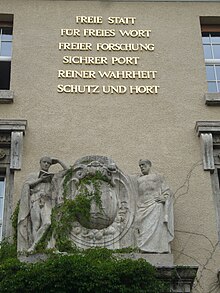Christoph Johann Friedrich Vitzthum von Eckstädt
Christoph Johann Friedrich Graf Vitzthum von Eckstädt (born October 14, 1863 in Dresden , † December 30, 1944 in Tiefhartmannsdorf ) was a German lawyer and Saxon State Minister .
Life
He came from the old Thuringian noble family of Vitzthum von Eckstädt . His parents were Count Otto Heinrich Vitzthum von Eckstädt (1829–1917) and his wife Johanna Amalie geb. Miltiz (1824-1876). In 1891 Christoph Vitzthum von Eckstädt married Countess Elisabeth born. von Harrach (1870–1961). With her he fathered two sons and five daughters.
After studying law in Lausanne , Berlin and Leipzig , he began working as a lawyer until he entered the royal Saxon civil service as legation secretary in 1890. After a year of training, he was transferred to the embassy of the Saxon King in Berlin in 1891 , from where he was ordered back in 1894. To promote his career, he accepted a position as a district assessor in Dresden in 1896 . In the administrative service he then rose to government assessor in 1897 and to government councilor at the Chemnitz district administration . In 1901 he was finally made official in Annaberg . From 1906 to 1909 he represented the Kingdom of Saxony in the Federal Council in Berlin. His knowledge of administration, the diplomatic corps and, last but not least, his outstanding ability recommended him in 1909 for the appointment as Royal Saxon State Minister of the Interior and for Foreign Affairs. He held this position until his retirement in 1918.
At the ceremonial laying of the foundation stone for the building of the German library in Leipzig, Vitzthum von Eckstädt formulated the motto for the collection of German literature in the newly established institution with the words: "Free place / for free speech / free research / safe port / pure truth / protection and safekeeping ". These words were then attached to the facade of the new building in large letters alongside a rhyme by Friedrich Schiller .
After the abdication of King Friedrich August III. The family moved to Tiefhartmannsdorf Castle in Silesia, which Vitzthum's father-in-law Ferdinand von Harrach acquired in 1874 and bequeathed to him in 1915. There, at the age of 81, Vitzthum succumbed to kidney disease in late December 1944.
literature
- Genealogical manual of the nobility , Volume 13.
- Herrmann AL Degener : Who is it? 1928, p. 1648.
- Andreas Peschel: Christoph Johann Friedrich Count Vitzthum von Eckstädt (1863–1944) , in: Vitzthumsche Familienblätter 16/2011, pp. 95–97.
- Andreas Peschel: Christoph Graf Vitzthum von Eckstädt (1863–1944). Minister in the Kingdom of Saxony from 1909 to 1918 , in: Vitzthumsche Familienblätter 20/2020, pp. 11–34.
Web links
- Short biography of Vitzthum on the homepage of the Saxon Ministry of the Interior
- Andreas Peschel: Vitzthum von Eckstädt, Christoph Johann Friedrich Graf . In: Institute for Saxon History and Folklore (Ed.): Saxon Biography .
- Entry by Christoph Johann Friedrich Graf Vitzthum von Eckstädt in the Stadtwiki Dresden
- Literature by and about Christoph Johann Friedrich Vitzthum von Eckstädt in the Saxon Bibliography
Individual evidence
- ^ Alfred Langer: Die Deutsche Bücherei in Leipzig, architecture and artistic jewelry (sites of Saxon art and history), Brandis-Beucha 1998, ISBN 3-930076-57-8 , p. 19.
| personal data | |
|---|---|
| SURNAME | Vitzthum von Eckstädt, Christoph Johann Friedrich |
| ALTERNATIVE NAMES | Vitzthum von Eckstädt, Christoph Johann Friedrich Graf |
| BRIEF DESCRIPTION | German lawyer and politician, Saxon minister |
| DATE OF BIRTH | October 14, 1863 |
| PLACE OF BIRTH | Dresden , Kingdom of Saxony |
| DATE OF DEATH | December 30, 1944 |
| Place of death | Tiefhartmannsdorf , Silesia |

